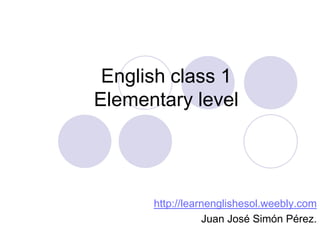
English class 1 a
- 1. English class 1 Elementary level http://learnenglishesol.weebly.com Juan José Simón Pérez.
- 2. VERBO ‘TO BE’ (affirmative) I Am (I’m) I am tall You Are (you’re) You are slim He Is (he’s) He is clever She Is (she’s) She is rich It Is (it’s) It is big We Are (we’re) We are tired You Are (you’re) You are in class They Are they’re) They are friends
- 3. VERBO ‘TO BE’(negative) I Am not I’m not You Are not You aren’t He Is not He isn’t She Is not She isn’t It Is not It isn’t We Are not We aren’t You Are not You aren’t They Are not They aren’t
- 4. VERB ‘TO BE’(questions) Am I…? Am I clean? Are you…? Are you ok? Is he…? Is he ill? Is she…? Is she at home? Is it…? Is it true? Are we…? Are we in time? Are you…? Are you interested? Are they…? Are they crazy?
- 5. VERB ‘TO BE’(questions) Exercise. Write the correct form of ‘to Be’ 1) We ___ happy. 2) Susan ____ (not) at home, she ____ at work. 3) ____ you angry with me? 4) He ____ tall but he ____ (not) slim. 5) ____ your computer on the table? 6) Toni and Mark ____ tired today. 7) They ____(not) poor, they are very rich, indeed! 8) ___ you free this afternoon?
- 6. VERB ‘TO BE’(questions) Exercise. Write the correct form of ‘to Be’ 1) We ARE happy. 2) Susan ISN’T at home, she IS at work. 3) ARE you angry with me? 4) He IS tall but he ISN’T slim. 5) IS your computer on the table? 6) Toni and Mark ARE tired today. 7) They AREN’T poor, they are very rich, indeed! 8) ARE you free this afternoon?
- 7. A / AN /THE Se utiliza a/an para nombres contables en singular cuando el oyente no sabe todavía de que hablamos. En español significa un, uno, una. An se usa cuando el nombre empieza por una vocal sonora, mientras que A se usa cuando el nombre empieza por consonante. Delante de palabras que empiezan por h se pone A / An dependiendo de si la h se pronuncia o no, respectivamente. En palabras deletreadas como FBI se usa an si la pronunciación empieza por vocal.
- 8. A / AN /THE Se utiliza THE para referirnos a cosas específicas cuando ya sabemos a que nos referimos: I have got a car. The car is blue. Se utiliza para cualquier tipo de nombre: singular o plural, contable e incontable (se puede traducir por el, la, los, las): the ball, the cars, the water… Algunos nombres se nombran con the delante: Algunos países: the USA, the Czech Republic, the Arab Emirates… Rios, océanos…: the Mediterranean sea, the Pacific Ocean… Selvas, montañas, penínsulas, zonas geográficas,etc: the Sahara desert, the Alps… También para referirnos a cosas únicas: the sun the Earth, the Eiffel tower…
- 9. A / AN /THE Examples: A horror film, an hour, an apple, a car, a door, a table, an activist, an editor, an FBI agent. Exercise. Write A, AN or THE: __ window __ orange __ flat __ President of the USA __ Earth __ house __ eye __ official letter __ child __ cd __ head __ MBI student
- 10. A / AN /THE Answers: A window AN orange A flat THE President of the USA THE Earth A house AN eye AN official letter A child A cd A head AN MBI student
- 11. ADJETIVOS Los adjetivos describen nombres. En inglés se ponen detrás del verbo to Be. My house is big. En inglés se ponen antes del nombre. This is a blue pen. Los adjetivos en inglés no van en plural con nombres plurales. I have got three black dogs. Se utiliza ‘very’ delante de los adjetivos. I am very hungry!
- 12. ADJETIVOS Algunos adjetivos: Small – pequeño Happy – feliz Big –grande Sad – triste Tall – alto Tired – cansado Long - largo Bored – aburrido Short – bajo, corto Fun - divertido Old – viejo, antiguo Excited –emocionado Young – joven Awake – despierto New – nuevo Asleep - dormido Modern - moderno
- 13. ADJETIVOS POSESIVOS Personal pronouns Possesive adjectives I MY You YOUR He / She / It HIS / HER / ITS We OUR You YOUR They THEIR
- 14. ADJETIVOS POSESIVOS Se utilizan para describir al nombre, expresando posesión o relación con éste. Van seguidos del nombre: my car, his flat… Se utilizan para nombres en singular y en plural No llevan apostrofes.
- 15. ADJETIVOS POSESIVOS Examples: My car is red. His parents are young. Their house is big. This is your pen. This is my cousin Joe and those are his friends.
- 16. ADJETIVOS POSESIVOS Exercise. Complete with the possesive adjectives for the pronoun in (brackets) 1) Tom has lost ________ book. (he) 2) Was ________ grammar book expensive? (your) 3) She eats_______ lunch very late! (she) 4) We are with _______ parents on holiday. (we 5) John has got _______ new car. (he) 6) Joe and Sue love ________ son. (they) 7) The cat broke _______ leg. (it) 8) He always drives ________ car, he could drive his own car! (I) 9) We’re visiting _______ relatives. (we)
- 17. ADJETIVOS POSESIVOS Exercise. Complete with the possesive adjectives for the pronoun in (brackets) 1) Tom has lost HIS book. 2) Was YOUR grammar book expensive? 3) She eats HER lunch very late! 4) We are with OUR parents on holiday. 5) John has got HIS new car. 6) Joe and Sue love THEIR son. 7) The cat broke ITS leg. 8) He always drives MY car, he could drive his own car! 9) We’re visiting OUR relatives.
- 18. Thank you for your attention!
